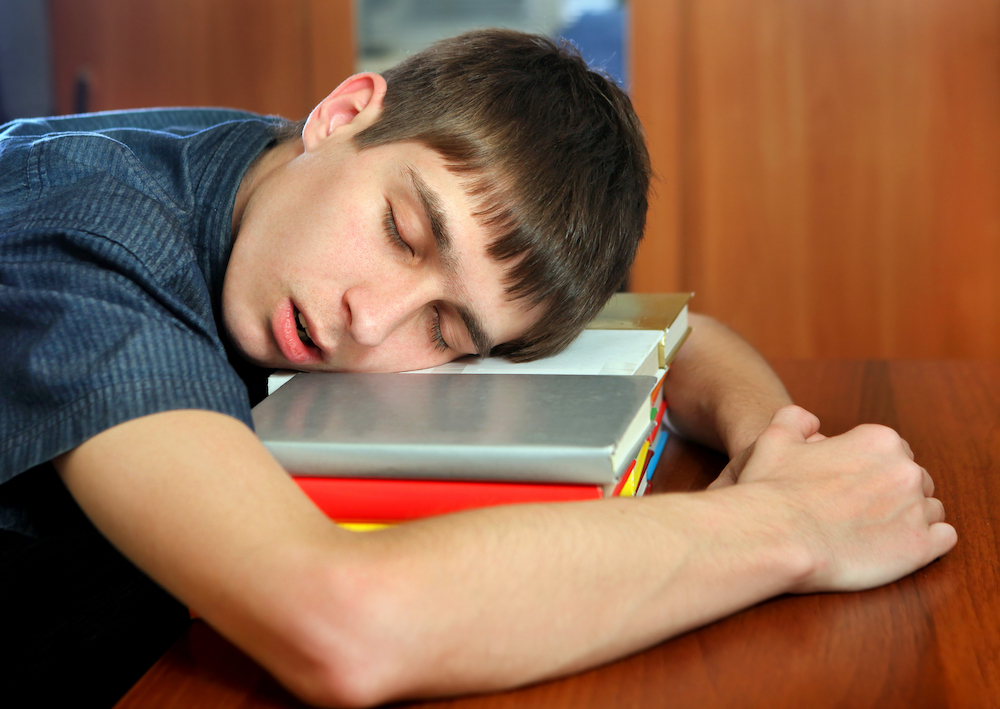Have an angsty teenager in the home? Sure, it could be one of many adolescent/teen symptoms – like puberty hormones, social(media) anxiety, or the natural push into independence. It might also be a lack of sleep.
Sleep deprivation is a precursor for all kinds of unpleasant symptoms, including poor or risky decision-making, moodiness and irritability, and lack of energy. Does that sound like your teen? While healthy nutrition and regular exercise are certainly part of the equation, examine how much sleep your teen gets on average.
Teens Need More Sleep Than They Get
Current studies indicate teens operate in a state of chronic sleep deprivation. The average teen gets 7 to 7 1/2 hours of sleep per night; research shows they need between 8 and 10 hours to be truly rested and to allow their bodies’ biochemical factories to regulate those turbulent puberty hormones.
As pediatricians, we like to remind parents that the developmental changes their teens experience are not so different than the vast development that takes place during the toddler years. So while everyone talks about the “terrible twos,” it’s good to remember that teenagers undergo their own uncomfortable and challenging evolution during – what could be dubbed – “the terrible teens.”
Here are some of the reasons your teen may need more sleep than their slightly younger siblings:
- They’re going through a second stage of brain development (cognitive maturation) requiring extra energy.
- Sleep supports healthy hormone production and regulation, and hormone production is on overdrive during the teen years.
- Academic and extracurricular demands mean they burn more physical and mental energy.
Signs Of Sleep Deprivation in Teens
Some of the signs your teen isn’t getting enough sleep include:
- Having a hard time waking up in the morning
- Unusual irritability, anxiety, mood swings, or depression
- Trouble focusing in school
- Falling asleep in school or on rides to/from school and after-school activities
Teens also have more difficulty getting enough sleep than younger siblings for biological and physical reasons.
Changes in circadian rhythm
Puberty shifts a child’s circadian rhythm to one replicating an adult’s. This means they have a harder time going to bed early. Most teens don’t get sleepy until about 10 or 11 p.m. at night. However, early weekday school starts or weekend morning activities can make it impossible for them to get the full 9 to 10 hours of sleep they need.
Earlier school start times
In most school districts, teens go to school notably earlier than their elementary school counterparts. We’ve long felt these schedules should be swapped because most young kiddos are early birds, while teens need that extra sleep.
Studying and extracurricular activities
The heavy demands of academics and extracurricular activities mean a sleepy teen might how to “power through” and finish homework for an hour or multiple hours after they should have been asleep.
Screen and phone use
The blue light emanating from screens, including phones, hinders the body’s natural melatonin production and sleep cycles. Therefore, we recommend all families purchase good old-fashioned alarm clocks and have a routine for “turning in and charging phones” overnight outside the bedrooms (more on that below).
Caffeine consumption
Trendy coffee drinks (also loaded with sugar) aren’t good for teens, especially if they’re consumed after school or in the evenings. Encourage your child to order “decaf” rather than caffeinated if they won’t go strictly for zero-caffeine options. They can also order drinks “half sweet” and might be surprised they’re even more delicious!
Help Your Teenager Get 8 to 10 Hours of Sleep Per Night
Establishing healthy sleep habits for the whole family is one of the best ways to help your teenager(s) get the amount of sleep they need each week. This means:
- Establishing set sleep/wake times and honoring those almost daily.
- Making sure they’re getting enough physical exercise each day.
- Let teens sleep in a little on the weekends – but not too much – or it skews their circadian rhythm.
- Encourage them to take 15 to 20-minute cat naps in the afternoon to get a little extra sleep.
- Setting clear screen time boundaries and prohibiting phones/tablets in bedrooms during sleep times.
- Minimizing their intake of stimulants (caffeine, sugar, etc.) after school.
- Create a comfortable sleeping arrangement, including minimal light (use blackout curtains).
- Use red nightlights for their hallway or bathroom to keep melatonin production going if they get up to use the bathroom.
Worried Your Teenager Doesn’t Get The Sleep They Need?
Are you concerned your teen is not getting enough sleep? There may be other issues at play, such as anxiety or depression. Schedule an exam at PANW, and we’ll work to get to the bottom of it.





